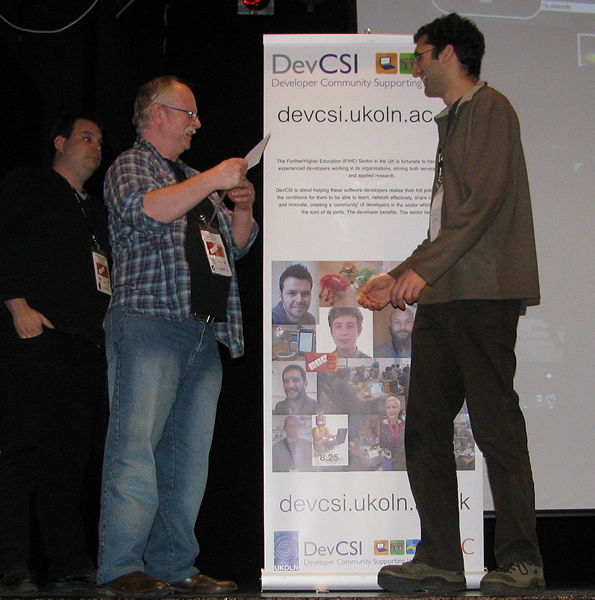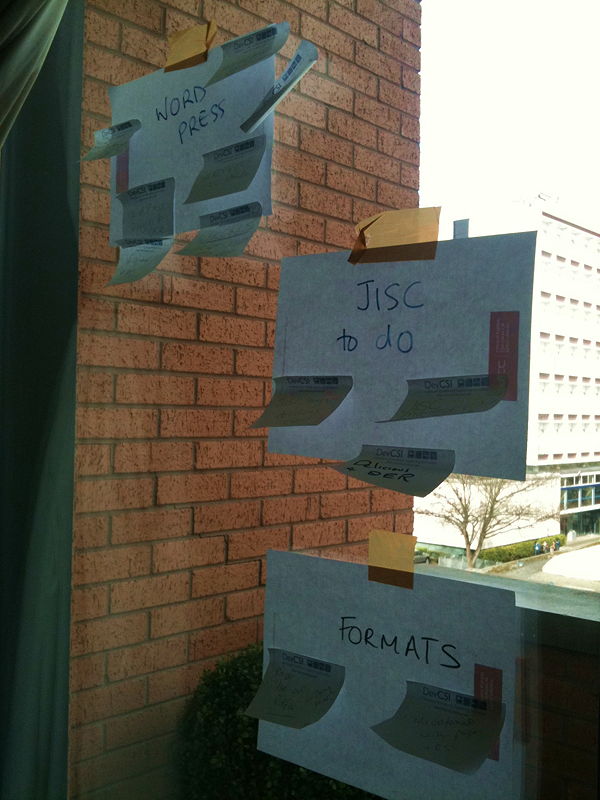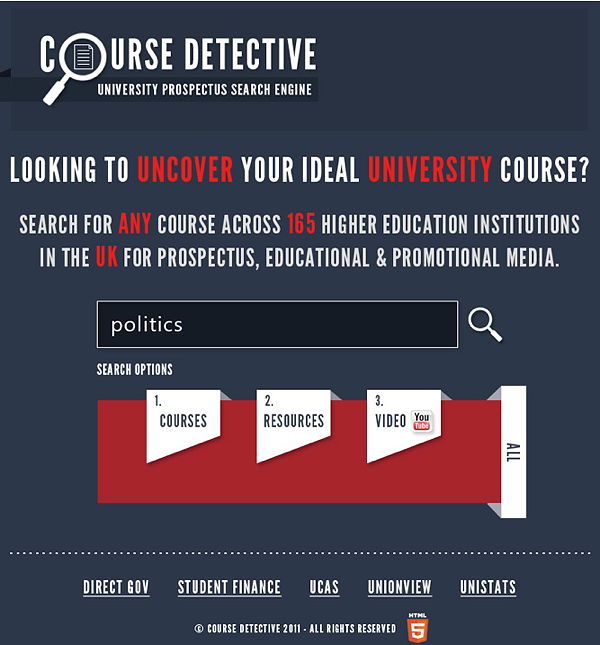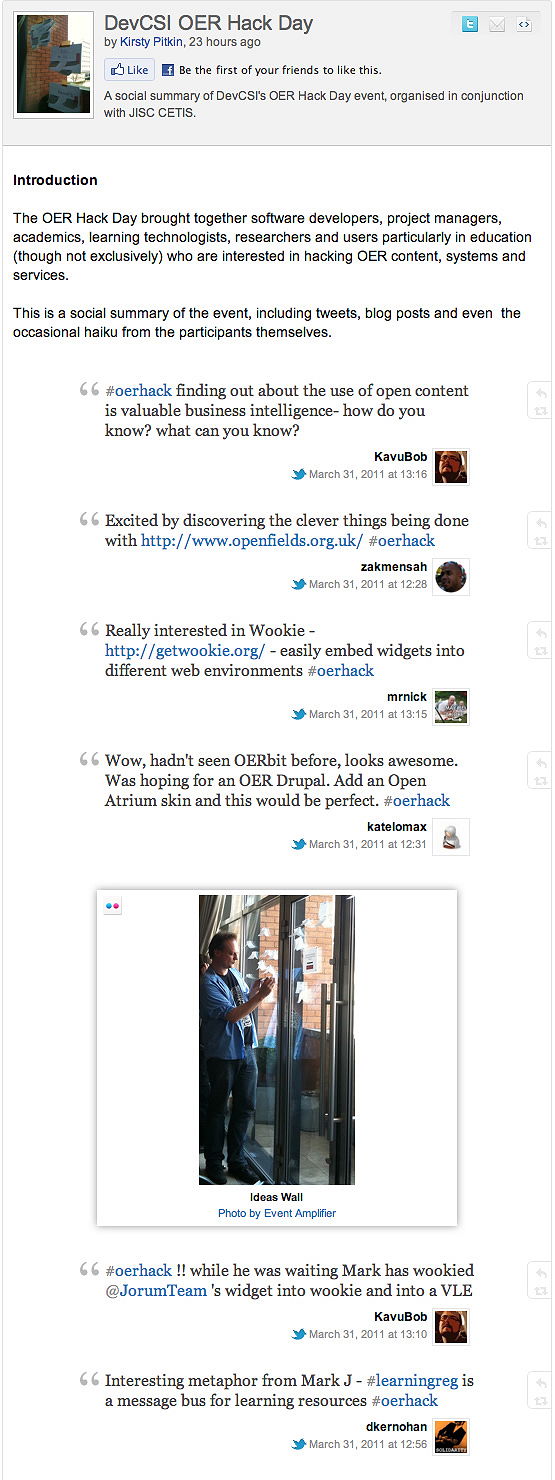Open Educational Resources Hack Day
The Open Educational Resources Hack Day event was designed to bring together those interested in rapidly developing tools and prototypes to solve problems related to OER. Whilst there is a growing interest in the potential for learning resources created and shared openly by academics and teachers, a number of technical challenges still exist, including resource retrieval, evaluation and reuse. This event aimed to explore some of these problem areas by partnering developers with the creators and users of OER to identify needs and potential solutions.
Participants came from a variety of backgrounds and levels of technical expertise, and included academics, learning technologists, repository managers, developers and librarians from UK institutions such as East Riding College, Harper Adams, Nottingham, the Open University, Oxford, and other organisations such as Creative Commons, the Learning Registry, Open Michigan, and TechDis.
To open the event, John Robertson from CETIS provided a brief overview of the discussions in the lead-up to the event, including blog postings by Nick Sheppard [1], Amber Thomas [2] and Dan Rehak [3]. Robertson also outlined some of the ideas shared prior to the event in both the email list discussion and the event wiki [4] which included an OER playlist picker and tools created using W3C widgets.
Mahendra Mahey (UKOLN), DevCSI Project Manager, provided a summary of the event aims for participants: to meet other experts in the field and start interesting conversations, to develop interesting new ideas, form mixed teams and develop prototypes (paper or electronic) or working code.
Lightning Talks
The event kicked off with a series of lightning talks from participants who wanted to share their project perspectives, interests and challenges for the group.
JORUM, Aggregated OAI-PMH, Open APIs, and Discoverable JORUM OERs
Nick Sheppard, Leeds Metropolitan University
Sheppard described his journey through various JISC-supported projects working with OER to identify areas for collaboration through the event. In describing his experiences, he discussed the recurring issue of getting content into JORUM, given the lack of OAI-PMH support, and his experience using SWORD to deposit resources differentially into multiple repositories and retrieve those resources from a central portal.
In particular, Sheppard described a desktop tool which allows academics to drag-and-drop resources straight into their local repository. However, he highlighted the current lack of metadata associated with the deposited resource under this system. As a non-developer, Sheppard was keen to document an extension to this tool which could solve this problem and identify potential collaborators to help bring this about.
Open Fields
Roger Greenhalgh, Harper Adams University College
Greenhalgh took us on a whirlwind tour of some of the ideas he has been exploring in relation to the new Harper Adams’ repository OpenFields [5], aimed at the “dirty -nailed practitioners” as he termed them in agriculture and land-based subjects. This includes not only formal papers, but also grey materials and other learning resources, which they wanted to make very findable to the public.
Greenhalgh discussed their Search Engine Optimisation (SEO) activities and their emphasis on creating short technical briefing papers with bullet points and pictures to explain practical issues, which can be easily found and used to lead people to the more academic resources, if appropriate.
This team created its own short url - inspired by the DOI system the OFI (Open Fields Identifier) and a plug-in within their VLE which allows you to search the repository and pull the resources out in order to use them. This brought to light problems identifying the attribution of photographs, so at Dev8D they created a prototype service to add a banner automatically along the bottom of any image displaying selected metadata. This prototype won first prize in the Picture This! competition.

Figure 1: Roger Greenhalgh (left) receiving the Picture This! prize at Dev8D
Greenhalgh discussed some of the new ideas that this work had triggered, which could be explored during the event. They included mechanisms to extract images and other data from PowerPoint resources, and ways to keep branding information separate from video content to avoid costly work when institutions re-brand.
OERca: A New Publishing Platform for Open Michigan
Ali Asad Lotia, University of Michigan Medical School
Lotia introduced several elements of his work from the Open.Michigan Project, including OERca, which was developed to help automate the due diligence process assessing whether OER materials are fully cleared. He explained how the OERca document import/export tool works with OpenOffice.org to extract materials, suggesting that participants may want to look into developing enhancements to this tool to allow users to process a wider variety of file types for use in OER.
He went on to discuss OERbit, their recently released Drupal-based OER publishing platform, which is available open source. He issued a challenge to write an installation script to help automate the install process for OERbit, making it easier for people to try.
“With many teams, their ambition outstrips their resourcing, so we are hoping to get other people interested in some of our ideas and to work with us’¦ as fresh perspectives usually make software better.” [6]
The Learning Registry
Daniel Rehak, Learning Registry
Rehak introduced the Learning Registry, which he described in a blog posting prior to the event as “social networking for metadata”.
Rehak discussed some of the difficulties and deficiencies associated with conventional metadata, and the advantages of looking at other types of data when searching and evaluating resources. He provided examples such as paradata (usage data), analytical data, linked data and context, drawing parallels with the ways in which Google and Facebook work.
“We have a legacy problem of hundreds of different metadata formats and it really doesn’t work for finding resources… if you look at the way that Google and Facebook work, they base their data not on conventional catalogues but on very informal things [such as] the usage of data and how things are related … so we are trying to see if we can capture similar information about learning resources. We believe that by doing this, that ‘second-class’ metadata can be used to build discovery systems and feedback loops.” [7]
Rehak outlined the flow from a resource being made available in the Learning Registry, which then creates a common metadata timeline, effectively re-aggregating metadata to show how the resource is used. This data can then be used a social way. They currently have around 180,000 paradata records, which can be quite small, such as “I like this data” or “I use this data”.
Rehak explained that the Learning Registry is an “open everything” push network which provides a set of APIs enabling developers to build interesting stuff on top. He emphasised that they were keen to see what participants could contribute to or build upon this during the event.
“We see Learning Registry as an international activity and we’re just at the point where we are starting to deploy, so this is a good opportunity for us to connect to people, see what people are doing in the UK and to see how we can leverage and build upon what we have already built.” [7]
Wookie W3C Widgets
Mark Johnson, University of Bolton
Johnson provided a brief overview of the Wookie Project, which aims to increase accessibility by creating external W3C widgets for tools and resources, which can then be brought into a wide variety of learning environments via a plug-in as and when the functionality is required.
He provided an introduction to the system in which a widget file is stored on the Wookie server, which then talks to a plug-in within your browser or web application. The plugin creates a space within that environment into which the server can inject the configured widget. Users are authenticated by the container web application, allowing the widget to remain simple and integrated.
Johnson concluded by demonstrating how easily he could create a JORUM widget, accessible to anyone engaging with the Wookie server within their environment, and showed how this would appear within Moodle, as a practical example.
Provenance, Attribution, Licensing and Teaching Resources
Amber Thomas, JISC
Thomas advocated a person-centered approach to OER, considering the incentives for sharing - including reward and recognition. She emphasised that feedback reflecting how others are using and valuing their OER is really important for those creating resources. This is also vital at management level, as identified by JISC-funded work examining activity data, which has shown this information to be really useful business data.
Thomas highlighted some of the current technical issues associated with attribution and licensing, noting that whilst Creative Commons licenses are useful, resources often only contain the Creative Commons logo for the chosen licence. Without a name or link to the licence, they fail to provide enough information for users to follow that licence appropriately. She emphasised the need for greater use of machine-readable licences to improve this situation.
In discussing provenance of OER, Thomas observed that we often assume we do not know very much about the identity of people online. However, she believes this is going to change, particularly as authentication across devices and OpenAuth grows. Knowing a tiny bit about who people are will help us know what they are doing, and will help make sharing resources on the web more sustainable. Thomas advised participants to assume that we are working towards this position when developing OER tools.
Thomas concluded that the end-game should be to make OER person-centric, as this may be a key way in which people will navigate through resources.
Let The Hacking Begin…
Following the lightning talks, participants were encouraged to discuss ideas and add them to the ideas wall, where they were collected together into natural groupings. Once these groups were established, those with an interest in a particular area gathered to discuss the practical work they proposed to undertake.

Figure 2: The OER hack ideas wall
The following groups emerged:
WordPress Widgets Group
This group brainstormed a wide variety of ideas relating to ways WordPress could be used to store, organise or expose OER, including its potential role as a repository, playlist picker and recommendation tool, connecting OER to people more directly.
PORSCHE Group
A group formed of representatives from the ‘Pathways for Open Resource Sharing through Convergence in Healthcare Education’ (PORSCHE) Project gathered to explore the user and technical requirements of bookmarking tools for learning objects, which could be used to help people submit feedback about resources, using customised Django apps.
Course Catalogue Group
This group looked at linking OER to specific courses, so the resources are connected with courses and institutions as a way of aiding discoverability and use. Their initial work involved taking a step back from OER to create a Google custom search to act as a complete course catalogue from all UK HE institutions, required as a backbone to their project. They then examined ways to connect OER to this and to design a user interface that would encourage students to use it to both discover courses and preview the materials used on that course.
OERbit Group
This group was interested in developing an automated installation for the University of Michigan’s open source OERbit code. The developers identified a number of problems with installing it on different systems, so spent time overnight working to remedy them.
OeRBITAL Group
This group was formed by Terry MacAndrew, who has been working on the UK Centre for Bioscience’s OeRBITAL Project to develop a MediaWiki populated with curated collections from existing OERs on subject areas within the biosciences, as assembled by academic discipline consultants. This has produced a wiki containing fairly loosely structured data, including useful paradata about the materials.
The group combined representatives from the OeRBITAL Project and the Learning Registry to examine how best to extract paradata from the MediaWiki and into the Learning Registry, and how this data could be used to improve the project as a whole.
Visualisations Group
Several people from different backgrounds and perspectives joined in conversation with Tony Hirst, who has been producing visualisations with different datasets using the visualisation tool Gephi. There was interest in the potential for this type of interpretation of paradata, and for examining the relationships between tagged resources. One of the potential use cases cited involved #ukoer tagged objects, which not only includes OER resources, but also the conversations around resources, such as blog posts and tweets using the tag.

Figure 3: The WordPress hack team working together
Group Insight
Whilst these groups were forming, I listened in on what became the WordPress group, who were discussing different use cases for WordPress within an OER context. They engaged in a heated debate about the how appropriate it is to focus on one tool, compared to a more service-orientated architectural approach, whereby users are not restricted to one environment in order to access valuable tools.
The counter-argument was that WordPress is widely used within academia, so is already a popular and familiar tool for a large number of users. They compared empowering someone by giving them a Swiss Army knife or empowering someone by giving them a sharper knife i.e. making interoperable tools versus making an existing tool more powerful.
The group agreed that there was a trade-off either way between long-term efficiency and a quick win.
Outcomes
After 24 hours of work, the groups presented the results of their efforts:
The Course Detective
The Course Catalogue group produced a Google Custom search engine to search over the undergraduate prospectus pages for all UK universities. They presented a conceptual design (Figure 4) and the live search interface [8] which includes filters for just courses or resources, or both. There will also be a tab to search over the YouTube channels available.

Figure 4: The Course Detective conceptual design by James Roscoe and Joel Reed
The group argued that a lot of OERs have been created in connection with a specific course, and can be a great marketing tool to help give a flavour of the course content. However, they are rarely linked to the course prospectus, so are rarely found by prospective students. The premise of the Course Detective is to create a rich search experience for prospective students that capitalises on OERs.
WordPress and OER: A List of Tools, Workflows and Hacks

Figure 5: Brainstorming
The WordPress group carried out a range of work to evaluate existing plugins and build up a range of resources to help make use of the WordPress platform in a practical way.
Its work included:
- Creating a new OER bookmarker and bookmarklet plugin: “FavOERite” which is platform-independent and mobile-compatible;
- Reviewing how to populate WordPress with feeds from the University of Oxford’s OpenSpires system;
- Feeding WordPress using FeedWordPress and Custom Post Types, to be displayed using Featured Post type;
- Creating a plugin to search against Xpert, RSS and APIs;
- Reviewing plugins for OER Creative Commons work.
The group also discussed ways in which WordPress could potentially integrate with the Learning Registry, including pulling information in through RSS and using the Salmon protocol [9] to flow comments back to the source. Both groups agreed that this could be a very interesting solution to create a reciprocal relationship between WordPress content and the Learning Registry.
Generating Paradata from MediaWiki
The OeRBITAL Group examined how to contribute paradata back into the Learning Registry by building a simple data pump that mines MediaWiki and transforms it into a paradata envelope for the Learning Registry. Currently this includes recommendation data, but the group noted the need for their antithesis, a “thumbs-down” option, together with more semantic information to contribute more valuable paradata about the resources in the future.
Sacreligious
The PORSCHE group demonstrated a proof of concept for a tool they named “Sacreligious” - an OER version of Delicious, built on Django. This automatically picks up licence-, author- and publisher-related data, where available, and includes a bookmarklet to help users add resources and personal descriptions as they browse.
Xpert Learning Registry Connection
John Poyau from the Learning Registry worked with the Xpert search API to parse it and push it into the Learning Registry. He identified some of the difficulties involved and made connections with representatives from Xpert at the event who could help take this work further.
Perspectives
I carried out a number of short video interviews with participants to find out why they had come and what they found valuable about the event. Here are just some of their responses…
Greg DeKoenigsberg, ISKME:
“The things to be hacked upon are sort of second interest to me. [Its about] meeting people who would bother to show up to an OER hack fest and the follow on opportunities after that…Code is secondary to knowing the people behind the code.” [10]
Lorna Campbell, CETIS:
“I think it has been a great opportunity to get developers together, because although there is a lot of interesting work going on, it can be quite scattered on the technical side. I’ve also been interested in the area of paradata, because that’s something we have been grappling with for sometime: how do we describe learning resources and how to do harness and capture the information that accrues around resources once they are out there on the Web?” [11]
Terry MacAndrew, OeRBITAL:
“The most valuable thing is the bandwidth you can get from personal conversation with experts in the field because you can discover what the emphasis on certain areas needs to be.” [12]
I also curated a social summary of the event using Storify [13] to capture the comments and reactions of participants at the event. This includes tweets, pictures, blog posts and even haiku reflecting on the event [14].

Figure 6: OER Hack Day Storify Summary
Conclusion
There were a number of common interests that had emerged from the two days, including the concept of paradata, OER-specific bookmarking tools and an ongoing OER hack community to pursue some of these ideas. All of the participants I spoke to emphasised the value of the connections this event allowed them to make, which will form the basis of such a community, and the organisers also expressed a keen interest in providing support to facilitate ongoing discussions.
It is probably too early to say what the most valuable outcome of this event will be, but the ideas and practical solutions which evolved throughout the two days demonstrate the huge potential for some really interesting innovation in this area.
References
- Sheppard, N., ‘Musings On The Developing OER Infrastructure’, March 2011 http://repositorynews.wordpress.com/2011/03/23/musings-on-the-developing-oer-infrastructure/
- Thomas, A., ‘OER and the Aggregation Question’, March 2011 http://infteam.jiscinvolve.org/wp/2011/03/29/oeragg/
- Rehak, D., ‘The Learning Registry: Social Networking for Metadata’, March 2011 http://blogs.cetis.ac.uk/othervoices/2011/03/22/thelearningregistry/
- CETIS OER Hack Day Wiki http://wiki.cetis.ac.uk/OER_Hack_Days
- OpenFields http://www.openfields.org.uk/
- Lotia, A.A., in interview with K. Pitkin, April 2011 http://vimeo.com/22118746
- Rehak, D., in interview with K. Pitkin, April 2011 http://vimeo.com/22119778
- Course Detective Live Search http://www.coursedetective.co.uk/
- Salmon Protocol http://www.salmon-protocol.org/
- DeKoenigsberg, G., in interview with K. Pitkin, April 2011 http://vimeo.com/22124131
- Campbell, L., in interview with K. Pitkin, April 2011 http://vimeo.com/22229819
- MacAndrew, T., in interview with K. Pitkin, April 2011 http://vimeo.com/22125297
- Storify http://storify.com/
- Pitkin, K., ‘DevCSI OER Hack Day’, April 2011 http://storify.com/eventamplifier/devcsi-oer-hack-day
Author Details
Kirsty Pitkin
Event Amplifier
TConsult Ltd
Email: kirsty.pitkin@tconsult-ltd.com
Web site: http://eventamplifier.wordpress.com
Kirsty Pitkin is a professional event amplifier who works closely with conference organisers to help extend the impact of their events using online media. She received an MA in Creative Writing and New Media from DeMontfort University, which stimulated her ongoing interest in communicating stories across a variety of social media and digital platforms.
